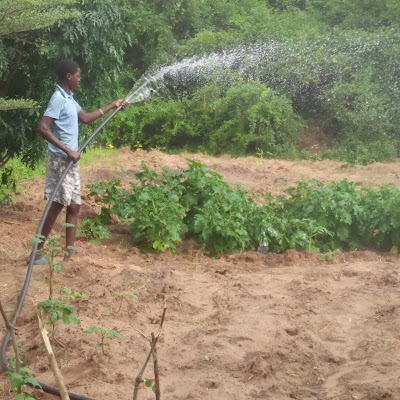Desperate and vulnerable households are resorting to child labor to cushion themselves from the effects of Covid-19
The economic fallout caused by the Covid-19 pandemic has led to increasing numbers of families facing economic insecurity and child labor has become an extreme coping mechanism for thousands of families facing economic shocks during this period.
I have documented a few cases of children who are engaged in child labor to help supplement their parent's meagre incomes and or provide for their sick parents.
James, is 8 years old and is in class five. Everyday of the week, he and his cousin, Geoffrey, a form three student, wake up and walk around the village hawking traditional vegetables,onions,tomatoes and bananas. They walk under the scorching sun from morning to dusk with plastic basins perched on their heads. They forego lunch to ensure they cover the whole village. On a good day when they're able to sell all the stock, they make about Ksh 300.
Francis, 16, has been working in his neighbours' farms since the schools were closed due to Covid-19. He moves from house to house looking for casual labor. Today, I meet him weeding and pruning in one of the farms. His fingernails are crusted in soil dirt. He uses a small hoe and his employer has contracted him to work in his one-acre farm. This work will take him up to 6 hours and get paid Ksh 200. "The money will help me buy dinner for my family. If I don't work, my family will not have enough to survive," he says.
Mary, is in grade 3. She should be playing with her mates at home but I meet her fetching water at a community water point. She struggles to balance a ten-litre jerrycan on her small head and I wonder if her small feeble frame will endure the heavy burden. She says the water is for home use. She will cover a distance of 3 kilometres to and from her home.
Jacob is 14 years old. He is in class eight and he should be at home revising for his final primary examinations but I find him in the fields. He has not known any other activity except farm work since he closed school. He alternates between weeding people's farms and hawking fresh produce. I meet him staking tomatoes in one of the farms. He will also apply manure and pesticides on the plants. Working under a very hot sun, he will get a daily wage of Ksh 100 which he tells me that he will give his mother to buy foodstuff at home. He has a younger brother and sister and they do division of labor by alternating hawking vegetables and tomatoes.
As the World marks #WorldDayAgainstChildLabour, it's important that governments make clear the steps they are taking to prevent millions of children from been pushed into the labor force especially in the context of Covid-19, hunger and children' s vulnerability.
#WorldDayAgainstChildLabor .








Comments
Post a Comment